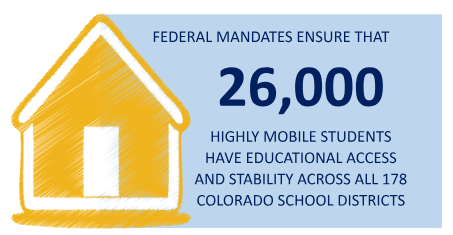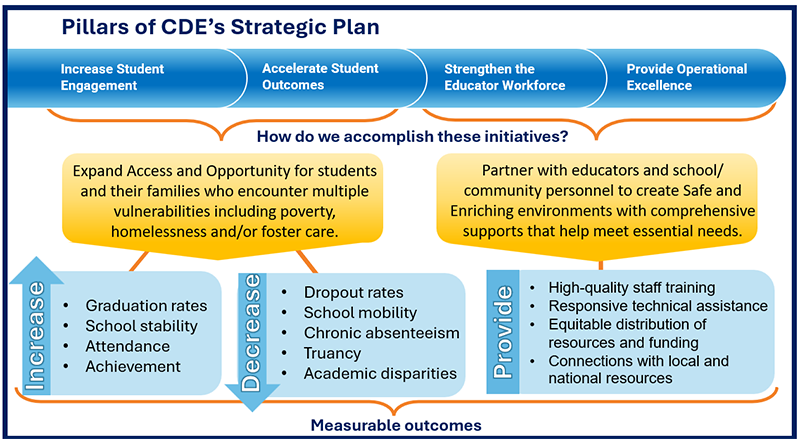You are here
Office of Student Support
About
Students and families need extra support during and outside school to succeed. This is crucial for students facing poverty, frequent school changes, and trauma. The Office of Student Support (OSS) increases access and opportunity for students and their families, so they are healthy, safe, supported, and engaged in thriving schools and communities.
OSS works with schools and community partners to make learning accessible and responsive for students and families during school and out-of-school time. The Office runs programs that provide students who encounter multiple vulnerabilities with additional whole-child supports and resources to increase educational access, stability, success and growth.
The OSS team includes state coordinators, specialists, evaluators, and support staff. They implement policies and programs across Colorado, working with other CDE offices to create successful learning opportunities for students and families. OSS also builds capacity at state and local levels to promote educational growth, focusing on highly mobile and underrepresented youth.
Reducing barriers and increasing resources for under-resourced students benefits everyone.
Out-of-School Time (OST) Grant Programs
- 21st Century Community Learning Centers
- Title V Sexual Risk Avoidance Education
- Colorado Academic Accelerator Program
- Colorado Nonprofits OST Program
OSS manages and invests over $25 million into multiple federal and state-funded OST competitive grant programs. These programs offer students and their families high-quality, supervised academic enrichment opportunities and services when school is not in session. OST is inclusive of before-school and afterschool programs, programs in the summer, and fifth day programs (if a district is on a four-day school week). Programs can occur on a school campus or facilities and can include a variety of:
-
academic programs (e.g., reading or math focused programs),
-
specialty programs (e.g., sports teams, STEM, arts enrichment),
-
and multipurpose programs that provide an array of activities (e.g., 21st Century Community Learning Centers, Boys & Girls Clubs, YMCAs).
Outcomes: Students who regularly attend out-of-school time programs demonstrate an increase in school day attendance, classroom participation and homework completion.
Highly Mobile Student (HMS) Programs
- Foster Care Education Program
- McKinney-Vento Homeless Education Program
- Educational Stability Grant Program
- Military-Connected Students
- Regional Collaborative Conversations Supporting Highly Mobile Students

- Students experiencing homelessness face significant challenges in accessing, stabilizing, and succeeding in school, negatively impacting long-term educational, economic, and employment prospects.
- A significant portion of students experiencing homelessness have prior engagement with the Foster Care system and/or hold intersectional identities and experience disproportionate barriers in securing a safe, stable, and affordable place to call home
- Students experiencing homelessness or involved in the foster care system have the lowest 4-year graduation rates of instructional program types; however, when given more time and more options toward completing high school there are statistically significant increases.
- Highly Mobile Students benefit from supported transition processes and local school board policies to protect their rights. Military-Connected students and the processes in place to support their transitions, offers frameworks to consider for supporting other HMS across Colorado.
Outcomes: School stability is an important factor in students having the opportunity to succeed in school by providing consistent and regular access to food, caring adults, friends, academics and the opportunity to explore their interests and talents. Promising practices such as full time McKinney-Vento District Liaisons and Family Resources Centers help highly mobile students navigate systems for greater success in school and life.



Connect With Us





